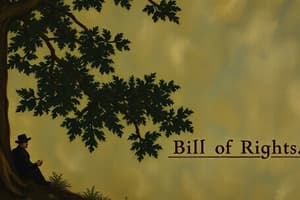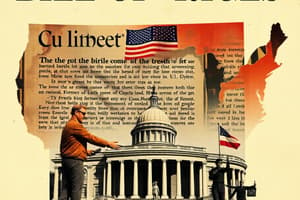Podcast
Questions and Answers
What are civil liberties?
What are civil liberties?
- Responsibilities of citizens
- Legal protections against government (correct)
- Laws that protect public safety
- Unalienable rights granted by a monarch
What does the Bill of Rights consist of?
What does the Bill of Rights consist of?
The first ten amendments to the U.S. Constitution.
What does the First Amendment guarantee?
What does the First Amendment guarantee?
Freedom of religion, speech, press, and assembly.
What was the significance of Barron v. Baltimore?
What was the significance of Barron v. Baltimore?
What was the main outcome of Gitlow v. New York?
What was the main outcome of Gitlow v. New York?
What does the Fourteenth Amendment state?
What does the Fourteenth Amendment state?
What is the incorporation doctrine?
What is the incorporation doctrine?
What is the establishment clause?
What is the establishment clause?
What does the free exercise clause do?
What does the free exercise clause do?
What was established by Lemon v. Kurtzman?
What was established by Lemon v. Kurtzman?
What was the ruling in Zelman v. Simmons-Harris?
What was the ruling in Zelman v. Simmons-Harris?
What did Engel v. Vitale establish?
What did Engel v. Vitale establish?
What was determined in School District of Abington Township, Pennsylvania v. Schempp?
What was determined in School District of Abington Township, Pennsylvania v. Schempp?
What is prior restraint?
What is prior restraint?
What was the outcome of Near v. Minnesota?
What was the outcome of Near v. Minnesota?
What is the significance of Schenck v. United States?
What is the significance of Schenck v. United States?
What was ruled in Zurcher v. Stanford Daily?
What was ruled in Zurcher v. Stanford Daily?
What did Roth v. United States establish?
What did Roth v. United States establish?
What did Miller v. California hold regarding obscenity?
What did Miller v. California hold regarding obscenity?
What is libel?
What is libel?
What did New York Times v. Sullivan establish?
What did New York Times v. Sullivan establish?
What was the ruling in Texas v. Johnson?
What was the ruling in Texas v. Johnson?
What is symbolic speech?
What is symbolic speech?
What is commercial speech?
What is commercial speech?
What did Miami Herald Publishing Company v. Tornillo rule?
What did Miami Herald Publishing Company v. Tornillo rule?
What was determined in Red Lion Broadcasting Company v. Federal Communications Commission?
What was determined in Red Lion Broadcasting Company v. Federal Communications Commission?
What did NAACP v. Alabama protect?
What did NAACP v. Alabama protect?
What is probable cause?
What is probable cause?
What does the Fourth Amendment prohibit?
What does the Fourth Amendment prohibit?
What is a search warrant?
What is a search warrant?
What is the exclusionary rule?
What is the exclusionary rule?
What case extended Fourth Amendment protections to the states?
What case extended Fourth Amendment protections to the states?
What does the Fifth Amendment protect?
What does the Fifth Amendment protect?
What does self-incrimination refer to?
What does self-incrimination refer to?
What did Miranda v. Arizona establish?
What did Miranda v. Arizona establish?
What rights does the Sixth Amendment guarantee?
What rights does the Sixth Amendment guarantee?
What was established in Gideon v. Wainwright?
What was established in Gideon v. Wainwright?
What is plea bargaining?
What is plea bargaining?
What does the Eighth Amendment prohibit?
What does the Eighth Amendment prohibit?
What was held in Gregg v. Georgia?
What was held in Gregg v. Georgia?
What did McCleskey v. Kemp address?
What did McCleskey v. Kemp address?
What is the right to privacy?
What is the right to privacy?
What did Roe v. Wade establish?
What did Roe v. Wade establish?
What did Planned Parenthood v. Casey determine?
What did Planned Parenthood v. Casey determine?
Flashcards are hidden until you start studying
Study Notes
Civil Liberties and Constitutional Amendments
- Civil liberties protect individuals from government overreach, formally outlined in the Constitution but interpreted by courts and legislators.
- The Bill of Rights consists of the first ten amendments to the U.S. Constitution, safeguarding fundamental rights like freedom of religion, speech, and press.
- The First Amendment guarantees four essential freedoms: press, speech, religion, and assembly.
- Barron v. Baltimore (1833) established that the Bill of Rights only applies to the national government, not states or municipalities.
- Gitlow v. New York (1925) ruled that free speech and press are fundamental rights under the Fourteenth Amendment, applicable to states.
Fourteenth Amendment and Incorporation Doctrine
- The Fourteenth Amendment prohibits states from infringing on citizens' rights to life, liberty, or property without due process and ensures equal protection under the law.
- The incorporation doctrine allows the Supreme Court to apply the Bill of Rights to the states through the Fourteenth Amendment.
Religious Freedom Clauses
- The establishment clause (First Amendment) prohibits Congress from establishing a religion.
- The free exercise clause prevents the government from interfering with religious practices.
- Lemon v. Kurtzman (1971) outlines conditions for aid to church-related schools: secular intent, non-advancement or inhibition of religion, and non-excessive entanglement.
Freedom of Expression and Press
- Engel v. Vitale (1962) struck down state-written prayers in schools as a violation of the First Amendment.
- School District of Abington Township v. Schempp (1963) deemed mandatory Bible readings in public schools unconstitutional.
- Prior restraint refers to government actions preventing material publication, generally unconstitutional in the U.S., as affirmed in Near v. Minnesota (1931).
Legal Standards for Speech
- Schenck v. United States (1919) determined that speech can be limited if it poses a "clear and present danger."
- Roth v. United States (1957) ruled that obscenity is not protected by the First Amendment.
- Miller v. California (1973) set community standards to judge obscenity based on prurient interest and offensiveness.
Defamation and Symbolic Speech
- Libel involves publishing false statements that damage reputations.
- New York Times v. Sullivan (1964) established that public figures must prove "actual malice" to win libel cases.
- Texas v. Johnson (1989) protected flag burning as symbolic speech under the First Amendment.
Commercial Speech and Media Rights
- Commercial speech, often restricted, has gained protection from the Supreme Court over time.
- Miami Herald Publishing v. Tornillo (1974) highlighted the limited government power to control print media.
- Red Lion Broadcasting v. FCC (1969) upheld stricter rules for broadcasting media due to limited frequencies.
Rights to Assemble and Search Protections
- NAACP v. Alabama (1958) affirmed the right to assemble peacefully, protecting membership lists from disclosure.
- Probable cause is needed for lawful arrests and searches, prohibiting unreasonable searches and seizures as per the Fourth Amendment.
- Exclusionary rule prohibits unconstitutionally obtained evidence from trial, as established in Mapp v. Ohio (1961).
Rights of the Accused
- The Fifth Amendment safeguards against double jeopardy and self-incrimination.
- Miranda v. Arizona (1966) requires police to inform suspects of their rights during questioning.
- The Sixth Amendment guarantees rights to counsel, confront witnesses, and a speedy trial, as reinforced in Gideon v. Wainwright (1963).
Punishments and the Right to Privacy
- Eighth Amendment prohibits cruel and unusual punishment, applicable to states via the Fourteenth Amendment.
- Gregg v. Georgia (1976) upheld the death penalty as constitutional.
- Roe v. Wade (1973) defined a woman's right to choose abortion, establishing differing state control based on pregnancy trimesters.
- Planned Parenthood v. Casey (1992) modified standards for abortion restrictions to the "undue burden" test, allowing for more state regulation.
Studying That Suits You
Use AI to generate personalized quizzes and flashcards to suit your learning preferences.




